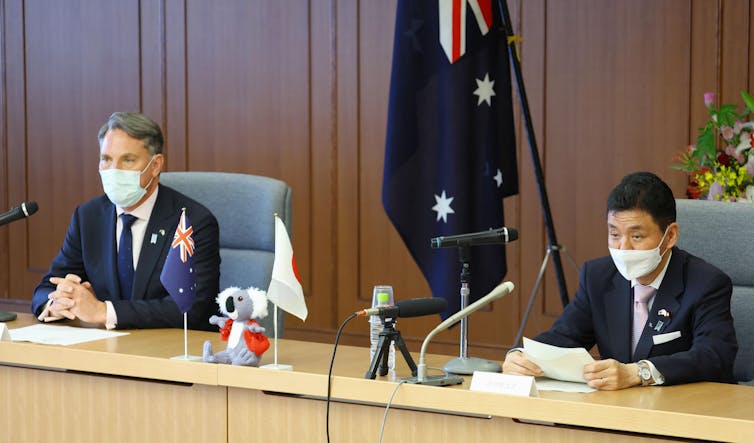Marles shifts tone on China at defence summit – but the early days of government are easiest
- Written by Nick Bisley, Dean of Humanities and Social Sciences and Professor of International Relations at La Trobe University, La Trobe University

In its first month in power, foreign policy and national security have played a major part of the new government’s activities.
Very soon after the election, Prime Minister Anthony Albanese attended the Quadrilateral Security Initiative (Quad) leaders’ meeting in Tokyo. Foreign Minister Penny Wong has made trips to the South Pacific and Indonesia. And this month, Defence Minister Richard Marles met ministers and other key figures in Singapore and Japan.
Marles’ historic trip sheds some light on the new government’s approach to national security matters.
Read more: It's great Albanese is in Indonesia, but Australia needs to do a lot more to reset relations. Here are 5 ways to start[1]
Signalling a new approach
Marles was in Singapore to join the first in-person Shangri-La Dialogue to be held since 2019.
This meeting, also known as the Asia Security Summit[2], has been run annually since 2002 by the think tank International Institute for Strategic Studies. It brings together defence ministers, chiefs of defence forces and related security policy makers from across Asia and beyond.
Marles’ plenary speech[3] at this meeting was one of the most interesting made by an Australian leader in some years.
It underscored the continuity in Australian policy: the importance of the UN and international law, the focus on the alliance and the commitment to defence expenditure increases made by the previous government.
But it also showed where key changes would be made, including a much greater focus on climate change, a change in attitude and approach to the South Pacific and a subtle but significant shift in tone toward China.
Marles’ predecessor had tended to paint China’s regional activity in semi-apocalyptic terms[4].
By contrast, the new defence minister emphasised recognising the reality of China’s rise but framed it in terms of responsibilities that come with it. He also stressed the need for China to accept and respect the restraints the great powers must exercise.
It was a thoughtful and measured approach that is a good sign of the direction of Australia’s regional policy.
Getting back on track with France, sideline meetings with allies
The deputy prime minister also had an extensive set of meetings on the sidelines of the dialogue.
This included 15 bilateral meetings with the defence ministers of Singapore, Solomon Islands, New Zealand, South Korea, Japan, Malaysia, Fiji, Indonesia, Canada, the US, Timor Leste, Philippines and Sri Lanka.
He also met with the French defence minister, himself newly appointed, making the point on social media[5] that Franco-Australian defence cooperation was “back on track”.
While in Singapore, Marles took part in the latest meeting of the Trilateral Security Partnership, an initiative of Japan, the US and Australia to advance shared security goals.
This produced a wordy joint statement[6] of intent to strengthen their collaborative initiatives in Asia.
An historic meeting with China’s defence minister
But the meeting garnering the most attention was with China’s defence minister, Wei Fenghe.
This was notable less for its content, which by all accounts followed relatively routine patterns, but for the fact it happened at all.
There have been no meetings between Australian and senior Chinese government figures for some years. The Australian ambassador in China has had virtually no access and the broader diplomatic relationship has been essentially non-functional.
It was a brief meeting and involved no major breakthroughs. But the fact it happened at all indicates Australia should be able to navigate back to a working relationship with Beijing without having to make concessions.
Shoring up the Japan-Australia relationship
Marles then travelled to Tokyo for meetings with counterparts in Japan.
Australia and Japan are one another’s most important security partners after the US, and each sees the other as a crucial component in their regional security strategy.
Despite considerable goodwill, this part of the trip did not yield any significant further developments in the two countries security cooperation – as was made clear by the somewhat sparse joint statement[7] it produced.
This may well be a function of the fact the two are already doing a lot together. Their practical capacity to do a great deal more, particularly of any strategic significance, is relatively constrained by resource limitations.
The early days are the easiest
The new Labor government has had a good first month or so on the foreign policy front.
It has been are active, engaged and well received by regional powers. It has struck a prudent balance between the changes it seeks and the importance of continuity.
Marles has played his part successfully, particularly in communicating the need to have a productive relationship with China while not giving ground on core issues.
But the early days are the easiest ones and the true test of the new government’s foreign policy has yet to come.
Read more: As Wong makes her mark in the Pacific, the Albanese government should look to history on mending ties with China[8]
References
- ^ It's great Albanese is in Indonesia, but Australia needs to do a lot more to reset relations. Here are 5 ways to start (theconversation.com)
- ^ Asia Security Summit (www.iiss.org)
- ^ speech (www.minister.defence.gov.au)
- ^ semi-apocalyptic terms (www.skynews.com.au)
- ^ social media (twitter.com)
- ^ joint statement (www.minister.defence.gov.au)
- ^ statement (www.minister.defence.gov.au)
- ^ As Wong makes her mark in the Pacific, the Albanese government should look to history on mending ties with China (theconversation.com)
















